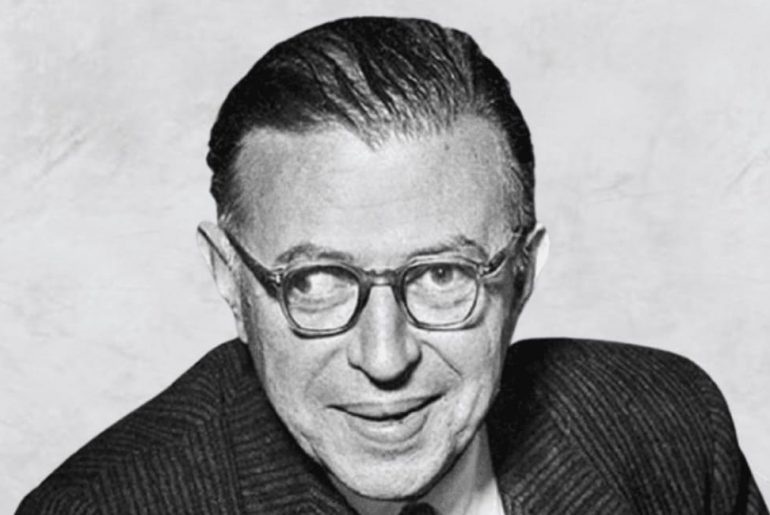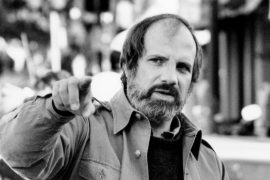The French philosopher, writer and political journalist is considered the most important and representative French intellectual of the 20th century. After the Second World War, he became an integrative figure of existentialism with enormous popularity. Jean-Paul Charles Armard Sartre conveyed his philosophy in numerous dramas, screenplays, novels and essays. Sartre gave the first insight into his world view of meaning, existence and freedom in 1938 with “Der Ekel” (German 1949). With the treatise “Being and Nothing” (1943, German 1962) he presented his basic position in a brilliant presentation. Politically, Sartre campaigned several times for the revolutionary movements in the so-called “Third World” and turned against them in 1977 the solitary confinement of the members of the terrorist group Red Army Faction (RAF)…
Jean-Paul Charles Armard Sartre was born in Paris on June 21, 1905 to Jean-Baptiste Sartre, a naval officer.
His mother was a niece of Albert Schweitzer and of German-Alsatian origin. His father died of yellow fever, a tropical disease, just 15 months after he was born. The mother remarried after the death of his father. Sartre was taught by changing private tutors until he came to the prestigious Lycée Henri IV at the age of 10. In 1917 his mother remarried and they moved with him to her new husband in La Rochelle. In 1920 he returned to Paris. In 1922 he passed the Baccalauréat. Sartre then began studying psychology, philosophy and sociology in Paris. In 1929 Sartre received his license to teach at the university. His friendship with Simone de Beauvoir also began in this year. He then worked from 1931 to 1936 as a high school teacher in Le Havre, where he was employed as a philosophy teacher from 1934. The scholarship that Sartre received in 1934 at the Institut Francais in Berlin enabled him to deal with the philosophy of Friedrich Nietzsche, Edmund Husserl and Martin Heidegger.
From 1937 to 1944 Sartre taught at the Gymnasium in Paris. Here he published his first book “Der Ekel” in 1938. This novel tells of the freedom and loneliness of the individual. At the same time, his debut work provided the first insight into his worldview. The central character, Roquetin, experiences existence as completely absurd and meaningless. In order to free himself, Roquetin decides to write about “disgust”. Sartre did military service from 1939 to 1941 in a medical group, where he was taken prisoner by the German Wehrmacht. From 1942 he earned his living in the Resistance. In 1942, Sartre’s play “The Flies” was shown for the first time in occupied Paris. In it, the resistance against the German occupation was cleverly camouflaged by him. In 1943 Sartre’s first main philosophical work was published: “Being and Nothing”. This work was about the total freedom and total responsibility of free people in the world. Since that time, Sartre has been considered the main French representative of an atheistic existentialism.
Sartre joined the “Comité National des Ecrivains” in 1943 and then became a contributor to the magazine “Combat”. Until 1944 Sartre was a philosophy teacher in Paris and active in the French Resistance against the German occupation. Sartre then settled in Paris in 1945 as a freelance writer, where he published the political-literary magazine “Les Temps Modernes”. The play “The Dirty Hands”, published in 1948, dealt with politics and morality. But the Vatican disapproved of the work because “the faithful must be spared dangerous doubts.” In 1952, Sartre joined the French Communist Party and recognized the Soviet Union’s leading role in world politics. In 1956 he resigned from the party because he felt that the Soviet suppression of the Hungarian uprising was a crime. Sartre’s second philosophical book “Critique of Dialectical Reason” was published in 1959. In the 1950s and 1960s there was criticism of Stalinism on the one hand, and trivialization on the other following his trips to the Soviet Union. After the May 1968 riots, he became a companion of the French Maoists from 1970 to 1973. From then on he campaigned for the disenfranchised of this world, as in 1979 with Raymond Aron for the “A Boat for Vietnam” campaign.
In 1965 the first part of his memoirs “The Words” was published. For this he received the Nobel Prize in Literature. He declined the award. However, the Nobel Committee decided that this award was irrevocable. From 1971 Sartre’s books “The Intellectual in the Revolution” and “The Imaginary. Phenomenological Psychology of the Imagination” were published. He then took over the management of the left-wing daily newspaper “Libération”. By 1973 he was practically blind. Nonetheless, he continued to be present. In 1974, his visit to the – in his opinion political – prisoner and RAF member Andreas Baader in the Stuttgart-Stammheim prison attracted public attention. 1979 attended a press conference in favor of the Vietnamese refugees known as the “Boat People”. On Sartre’s 70th birthday, the world press recognized the life’s work of the unconventional writer. A year later he received an honorary doctorate from the Hebrew University of Jerusalem.
Jean-Paul Charles Armard Sartre died on April 15, 1980 at the age of 74 in Paris. His death was registered worldwide, 50,000 people attended his funeral.
Who is Jean-Paul Sartre and what is his contribution?
Jean-Paul Sartre was a French novelist, playwright, and philosopher. A leading figure in 20th-century French philosophy, he was an exponent of a philosophy of existence known as existentialism. His most notable works included Nausea (1938), Being and Nothingness (1943), and Existentialism and Humanism (1946).
What did Jean-Paul Sartre believe in?
Sartre believed in the essential freedom of individuals, and he also believed that as free beings, people are responsible for all elements of themselves, their consciousness, and their actions. That is, with total freedom comes total responsibility.
What is Sartre’s idea of freedom?
Sartre writes that freedom means “by oneself to determine oneself to wish. In other words success is not important to freedom” (1943, 483). It is important to note the difference between choice, wish and dream.
What did Jean-Paul Sartre teach?
Sartre then taught philosophy at various schools, notably at Le Havre from 1931–36 and while he was composing his early philosophy and his great philosophical novel, Nausea.
Does Sartre believe in free will?
J. P. Sartre believes that man is free to choose and whatever choice he makes, he must be responsible for the outcome.
What is bad faith according to Sartre?
Sartre regarded bad faith as a denial of freedom which we all have. He gives an example of a waiter, who tells himself that to wait on tables is his destiny. The takeaway here is that to blame social pressures or others for what we are or what we do may be comforting, but it is a denial of the freedom we have.
Why did Jean-Paul Sartre say that man is condemned to freedom?
According to Sartre, man is free to make his own choices, but is “condemned” to be free, because we did not create ourselves. Even though people are put on Earth without their consent, we must choose and act freely from every situation we are in. Everything we do is a result of being free because we have choice.
Why does Sartre believe that existence comes before essence?
In order to remove the obstacles in front of human freedom, Sartre argues that existence precedes essence. If existence precedes essence, man himself, will create his essence, and thus will be responsible for his actions. In this way of thinking, there is no necessity for the existence of God.
Why did Sartre claim in choosing myself I choose man?
In choosing and creating a life for yourself, you are at the same time affirming what it is good for any person to do and to become. An individual’s action will affect and shape mankind.
What’s the difference between essence and existence?
Thus there is no real distinction between existing essence and its act of being (esse ); existence is only a mode of essence, a degree, an intensity, through which essence has become real. This mode is intrinsic to essence and puts it outside its causes.
Who or what is the source of values for Sartre?
Sartre’s ethics is not an ethic of autonomy (cf. Kant and the moral law), but a moral independence, individuality to which the subject refuses any submission to an external law, considers itself as the sole source of values.





